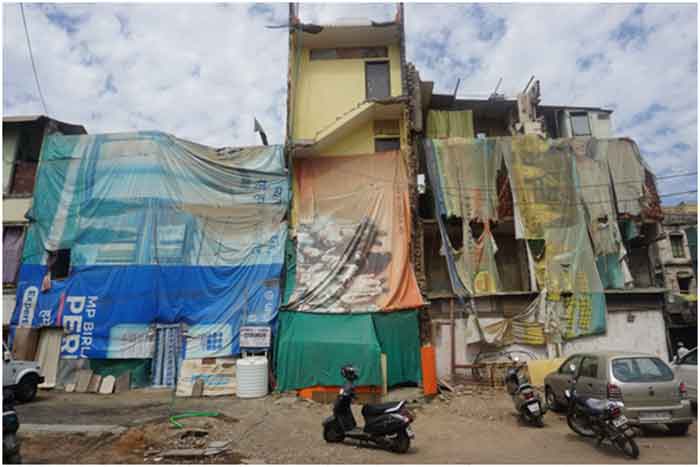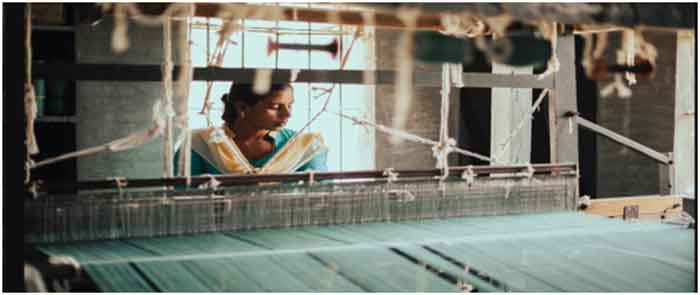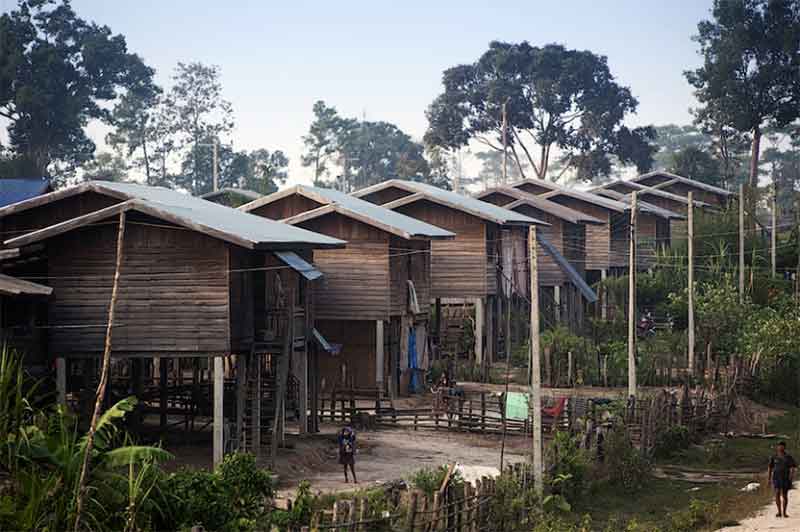Stop. Think.
To me, the first word that comes to mind is development. Cambridge Dictionary defines development as the process by which something grows or changes and becomes more advanced. In Economics, development is irretrievably tied with persistent growth with the most popular metric for measuring such growth: GDP. As a consequence, some countries are considered developed, and others, like India, are apparently still developing. The data suggests that GDP is rising year on year. But it does not account for the fact that there is corresponding loss in biodiversity, and increases in air pollution, economic inequality and surveillance capitalism. This begs the question: What exactly are we developing towards?
Ask an elephant shot at by an angry mob, a shopkeeper displaced by a smart city project, a fisherman whose livelihood is destroyed by a power plant, a mother whose stomach is cut open unnecessarily so she can give birth to her child or a migrant who has walked hundreds of kilometers home – what they think of development. Clearly, whatever development is, their experiences indicate they have paid the price for it.
You may well wonder why I chose these specific examples to expose the violence of development. It is because I happened to be part of a series of conversations where the stories of people directly engaged with these challenges and consequences of development were told.
Conceived by Bhargavi Rao, Deputy Director of the Center for Financial Accountability and Trustee, Environment Support Group, the ‘Interdisciplinary Action Research: Conversations with Emerging Leaders’ series was launched with the objective of giving young researchers and activists a platform to share their work with a wider audience. This at a time when the world was adjusting to a new normal with unlocking of cities, masks, restricted meetings, work from home and staying safe. It also emerged as a critique of the mainstream development paradigm and showcased these young leaders’ efforts to build humane, viable alternatives in the post covid world.
A confusing phrase often closely related with development is ‘world class’. As India’s cities become increasingly congested with traffic, choked by pollution and sinking in poverty, massive investments began to be made in Smart City Mission projects, as though it would magically transform existing cities into world class metropolises. This resulted literally in bulldozing several old neighbourhoods in several cities. Indore’s Smart City project is a case in point, as was discussed by Chinmay Mishra and Gaurav Dwivedi. Initially, the project was met with much resistance as it would displace a large number of people and destroy their livelihoods. What’s more, it was implemented in the oldest part of the city irreversibly destroying the heritage of Indore.

Chinmay Mishra described the resistance and it’s subsequent crushing: “Women protesters were beaten. People were jailed. Buildings were torn down overnight. In the end the pressure from the administration was so strong that people realised there was nothing they could do anymore”. Gaurav Dwivedi threw light on the role corporate finance plays in these projects, noting that while international investors are trying to make a quick buck out of them, they’re also simultaneously influencing policy recommendations.
It’s not just smart cities that international investors are funding, but also thermal power plants, as was revealed by Anuradha Munshi of the Center for Financial Accountability and Bharat Patel of the Machimar Adhikar Sangharsh Sangathan. In 2007, construction began on the 4000 MW Mundra Ultra Mega Power Project along the coast of a small fishing village in Gujarat. One of the major investors in the project was the International Financial Corporation (IFC). Bharat described how industrialisation in Mundra decimated the coastal mangroves, contaminated groundwater and displaced large numbers of fisherfolk.
Seeking relief, the fishing community filed a case against IFC in the US, where it is headquartered. After many years of legal battles, the US Supreme Court in a landmark judgment declared that international organisations, such as IFC – the private sector lending arm of the World Bank enjoy no immunity from being sued in the US. This was a huge political win not just for the people of Mundra, but also for other communities across the world devastated by such international financial institutions. Ms. Munshi made a fervent appeal to participants to continue the struggle against such forms of ‘development’ finance: “For too long, institutions like IFC, ADB and the World Bank have gotten away with non-performing assets, human rights violations and environmental destruction. In a planet so fragile, their mode of financing is really a race to the bottom. For each of us, it is an existential question. If we want our planet to survive, we have to fight these institutions. Every step they take, we have to meet with resistance.”
While international funders like IFC and the World Bank invest in massive infrastructure projects that destroy lives and livelihoods, fortunately there are also smaller enterprises that seek to bolster local economies. One such example is the Janapada Khadi initiative based in Melukote, Karnataka. Sumanas Koulangi and GN Raghu, representatives of the organisation, explained how it is strongly based on Gandhi’s philosophy of Swaraj and strives to treat all it’s members in a humane way. As Sumanas shared: “We’ve consciously ensured it remains a small organisation, so that members feel a greater sense of connection with each other. What’s more, one-third of the capital investment comes from the workers themselves. This makes them feel empowered as owners of the enterprise, not just as labourers.”

A mechanical engineer by training, Raghu spoke of his focus on creating affordable machines which can process cotton at the local level, thereby bolstering livelihood opportunites of farmers and weavers. He went on to explain just why this is so important from an ecological perspective: “Since most cotton processing machines are built only to process Genetically Modified cotton, this disincentives growing pest-resistant desi cotton. And in India, an estimated 50% of all pesticides used are for cotton plants”. Sumanas went on to reveal that in the mainstream textile industry, most mass-market clothing is produced under highly exploitative conditions, where workers are paid inhuman wages. Raghu appealed for more conscious consumption: “Rather than buying three shirts costing Rs. 400 each made using power looms and synthetic dyes, it is much better to buy one Khadi shirt which costs Rs. 1,200”, he asserted.
In another session of the IAR series, the ethics in most modern obstetrics wards came under rigorous scrutiny. Chetana Kulkarni of The Birth Home and Mallige of Karnataka Janashakthi came together to discuss the growing need for natural birthing. Chetana questioned the overuse of diagnostics instruments and needless surgical interventions in most modern obstetrics centers. One particular intervention she drew attention to was the C Section. WHO recommends it should not be used in more than 10 – 15% of births. However, she highlighted with grave concern, that in many states of India the percentage is far higher. In Telangana, for instance, nearly 50% of births are via the C Section. Despite the rise in such medical interventions, Mallige noted that the maternal mortality rate in India still remains alarmingly high.
Wanting to offer mothers a more humane process, Chetana co-founded The Birth Home, a natural birthing center which is centered around the philosophy of midwifery. At The Birth Home, skilled midwives provide an option to women who prefer to give birth away from a traditional obstetrics ward. Attempting to make the birthing process as humane as possible, individualised care is offered to expecting mothers. As Chetana put it, “We try to offer holistic care where all the needs of the mother are met – emotional, physical and nutritional.”

Despite The Birth Home’s admirable efforts to make the birthing process more humane, the harsh reality is that their services remain unaffordable to much of the population. One section in particular which struggles with health related issues – both maternal and otherwise – is migrant labour. Divya Ravindranath and Abha Rao, researchers focusing on migrant security and health, discussed some of the issues migrant labourers face today. Abha brought to light some of their health related complications: “When compared to the rest of the population, migrants have higher rates of communicable diseases like tuberculosis and non-communicable diseases like diabetes. They are also at greater risk of occupational hazards, social violence, alcoholism and STDs”.
Drawing from her field research at various construction sites, Divya pointed out that migrant women have it even worse. Not only are they paid lower wages, they also have access to very poor sanitation facilities, which often results in them developing urinary tract infections. Divya also cited her research on migrant children, noting that their nutrition levels are amongst the lowest in the country. From all of this it was clear that migrant labourers already faced great challenges, even before the brutal lockdown made them visible to the rest of the nation. As the conversation turned towards solutions, Abha advocated for a stronger push towards unionisation of migrant labourers, as this would allow greater representation of their interests, both to their employers and to the Government. Divya called for more young researchers to enter the field of migrant studies, as she felt this would draw much needed attention to their lives.
Another pair of young researchers, Sana Huque and Vinay Kumar, spoke of their efforts to protect Bengaluru’s lakes. Sana, who is a Senior Research Associate with Environment Support Group (ESG), shared her experiences on studying several lakes across Bengaluru. She cited how Subramanyapura Kere, Begur Kere and Jaraganahalli Lake have all been victim to contamination from untreated sewage, industrial waste and also encroachments. The findings of her research have been used as evidence in ESG’s lakes PIL,which has resulted in favourable judicial orders to safeguard these very lakes.

A few years ago, Vinay Kumar discovered that there was a proposal to redevelop the Begur lake, build three concrete islands within it and open it up to boating, all in gross violation of the lake conservation guidelines secured by ESG’s litigation efforts. Concerned about conserving the lake’s natural ecology, Vinay contacted ESG and collaborated to protect this lake and many more. Both Sana and Vinay called for greater citizen engagement to protect Bengaluru’s lakes. “I don’t mean to sound alarmist but we really don’t have the time to simply sit around. All of us need to act now to save our city’s lakes”, Vinay asserted.
While ecological commons like lakes undoubtedly need our attention, another area where activism is emerging is that of the digital commons. Anivar Arvind of the Software Freedom Law Centre and Sunil Abraham, recently appointed as Public Policy Director for Data and Emerging Tech at Facebook discussed the importance of democratising the digital commons in the Indian context. Anivar observed that systems which were previously open are increasingly being controlled by the Government. He drew attention to the way in which UPI and AADHAR have been implemented, noting that they allow centralisation of data and increased surveillance on citizens.
Protecting people is often the argument authorities make for surveillance systems. The coronavirus pandemic has prompted governments across the world to force their citizens to download mobile phone applications such as Aarogya Setu, to contain the spread of the virus. As a petitioner in the Karnataka High Court questioning the safety of data privacy of Aarogya Setu app users, Anivar is deeply concerned that the “Aarogya Setu app is encroaching into our personal devices. What you download on your phone should be your personal choice, but Aarogya Setu is being forced upon us by various authorities”. He went on to reveal that his petition has brought some positive results, including a revocation of the requirement for having the Aarogya Setu app to use the Bengaluru Metro, or to fly.
Echoing many of Anivar’s views, Nandini Chami of IT for Change also expressed her concerns on data being misused. She called for a Data Protection Bill to ensure that sensitive data of citizens’ is afforded the highest degree of privacy. Like Anivar, she also advocated for greater decentralisation in data governance. Nandini’s colleague Deepthi Bharthur called for a democratisation of the ways in which data is collected, stored and monetised: “The people from whom data is generated must have a right to decide how it is used”.
While Anivar, Nandini and Deepthi’s main focus is on ensuring that those in power do not monopolise the digital commons, Dhruv Chakaraverti of SEWA, shared how he and his colleagues approach this very issue in a different way, striving to digitally empower people, especially those with limited data literacy. He highlighted SEWA’s farm to table initiative which leverages the power of digital tools to link farmers directly with consumers.
Technology isn’t just leveraged to help farmers, it’s also rather surprisingly used to help an animal that humans are increasingly frequently in conflict with – elephants, for instance. Vinod Krishnan and M Ananda Kumar of Nature Conservation Foundation shared their experiences in mitigating human-elephant conflict in Valparai (Tamilnadu) and Hassan (Karnataka), largely with the help of simple mobile technology. Along with the Forest Department and local communities, Vinod and Ananda have been involved in setting up Early Warning Systems in these areas. As a part of this system, mass SMSs are sent out with the relevant details whenever an elephant is spotted near a human settlement. For people who cannot read, voice messages are sent. In addition to this, there are digital display boards at several junctions which also serve to inform people about the presence of elephants.

These efforts have been a great success, serving to not only bring down both human and elephant deaths, but also to reduce property damage. Despite these positive outcomes, Vinod was quick to point out that there would not have been such high rates of human-elephant conflict in the first place had forest land not been rampantly diverted for developmental projects. Agreeing, Ananda said, “There is so much support for people but very little for animals. We need more voices to speak up and protect the interests of wildlife and forests.”
One place that actively works to protect the interests of the natural world is the Gurukula Botanical Sanctuary, a forest garden and conservation centre in Wayanad, Kerala. Nikta Rao, Lorenzo Castellari and Saji Velli, facilitators of the Sanctuary’s School in the Forest initiative, came together to discuss their approaches to offering children an ecological education. Lorenzo stressed that the primary objective of the Sanctuary’s educational programmes is to inculcate a sense of love and respect for nature, for from this love arises a desire to protect. In order to instil this attitude in children, the Sanctuary requests that schools send students for long stretches and for repeated visits. Nikita explained that learning at the Sanctuary is experiential, sense based and revolves around participation in the community life and activities. Sajji shared that his teaching approach is largely hands-off: “Encouraging children to explore the forest on their own kindles their inner curiosity.”

Most of the schools that send their students to the Sanctuary follow alternative learning methods. While Nikita advocated for making nature education an intrinsic part of mainstream educational curricula, Lorenzo acknowledged that this would be a challenge because of prevailing norms. He also shared that as an educator, his biggest challenge was to get children to ask questions and think differently, rather than merely teach them new concepts and theory.
Initiatives like the School in the Forest illustrate that an inclusive, ecocentric education is possible, even as most typical schools offer a model of education which is highly competitive and largely anthropocentric. As labour laws get rewritten to favour large corporations, small enterprises like Janapada Khadi show that it’s possible for employer-employee relationships can be fair and humane. As modern obstetrics wards continue to unnecessarily cut open expecting mothers, midwifery centers like The Birth Home spring up to assist with natural births. As man-animal conflicts spike due to shrinking habitats, organisations like Nature Conservation Foundation leverage technology to save lives – both human and elephant. As the violent, destructive juggernaut of development keeps pushing on, young leaders and activists emerge to challenge it and build imaginaries of a kinder world.
At just 24 years of age, I often find myself disillusioned with humanity and the present state of the world. Political turmoil, rising communalism, social inequality, climate change, ecological devastation….the list of our mistakes seems to just go on and on. There are times when this disillusionment escalates into a paralysing feeling of despair, as when I watched millions of migrants pitifully walk home this summer. But listening to each of the stories from the Interdisciplinary Action Series gave me hope. It reminded me that while humans can obviously be destructive and violent, they can also be kind and just. And it showed me that the way to deal with disillusionment and despair is not paralysis, but action.
Ashwin Lobo Research Associate, Environment Support Group
SIGN UP FOR COUNTERCURRENTS DAILY NEWSLETTER















































